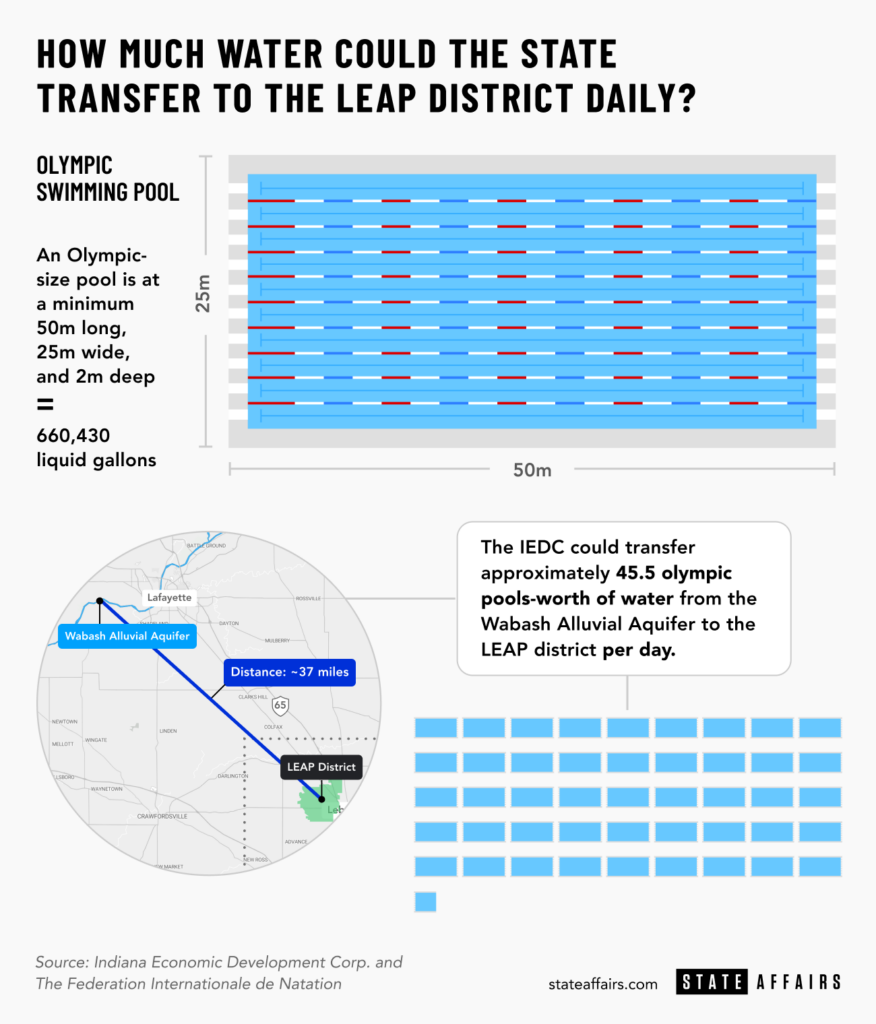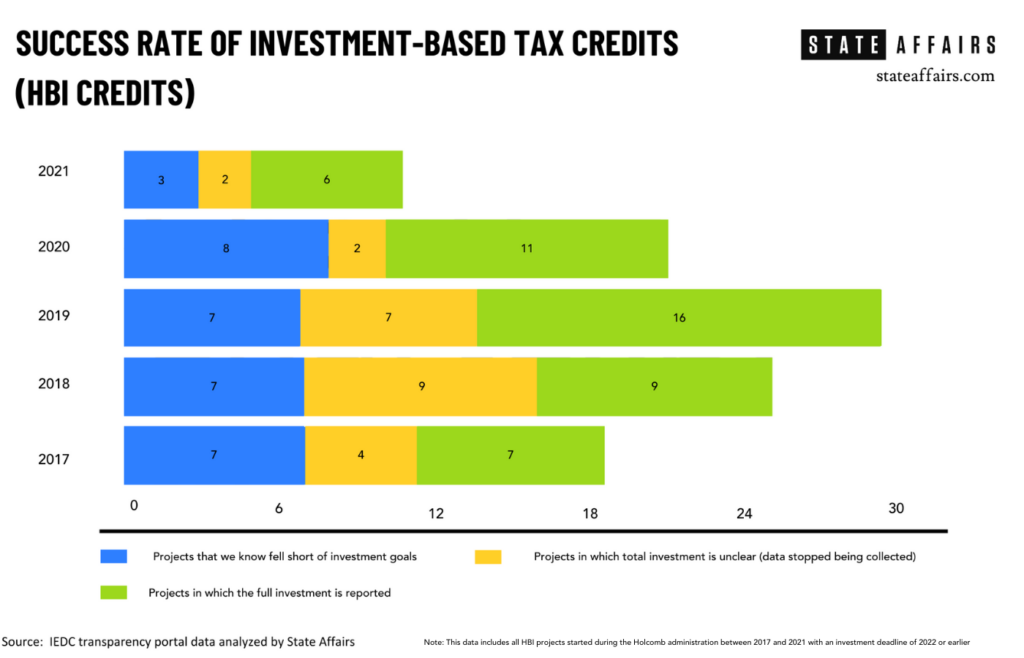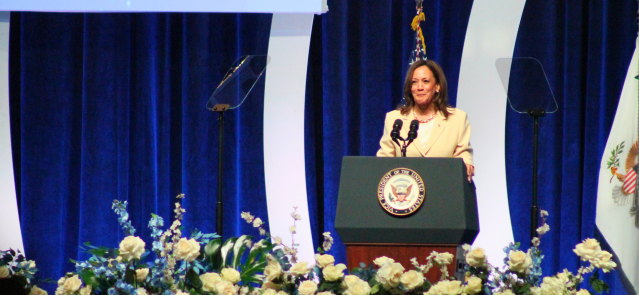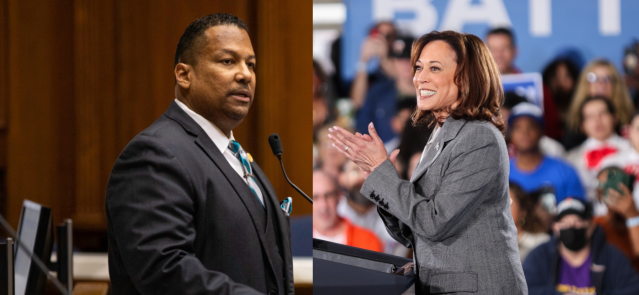Stay ahead of the curve as a political insider with deep policy analysis, daily briefings and policy-shaping tools.
Request a DemoLawmakers move to increase oversight of the Indiana Economic Development Corp. amid LEAP District concerns

Commerce Secretary David Rosenberg, left, and Gov. Eric Holcomb during an Indiana Economic Development Corp. board meeting on Dec. 14, 2023. (Credit: Mark Curry)
Gist
Indiana lawmakers are considering increasing oversight of the Indiana Economic Development Corp. amid growing bipartisan frustration with the quasi-government agency tasked with luring employers to the state.
On Thursday the Senate Commerce and Technology Committee will hear Senate Bill 295, which would add two members of the Indiana General Assembly to the IEDC’s governing board as non-voting representatives.
Legislation putting guardrails around the IEDC when it comes to large water withdrawals is increasingly less likely to move while deadlines near.
IEDC leadership declined to comment on that or other bills that would impact the IEDC.
“It would be premature for us to comment on legislation this early in the process,” IEDC spokeswoman Erin Sweitzer said.
What’s happening
It’s not uncommon for Democrats to file legislation targeting the IEDC, a part of Republican Gov. Eric Holcomb’s administration. But it is rare for multiple Republicans to file such legislation and for that legislation to receive a committee hearing.
Half a dozen bills from Democrats and Republicans alike were filed this year to increase oversight of the IEDC.
Some lawmakers, local elected leaders and other Hoosiers from Tippecanoe and Boone counties were unhappy with what they viewed as a lack of transparency from the IEDC in the early stages of the creation of the LEAP Innovation and Research District, designed to lure high-tech, high-wage companies to ready-to-build-on land.
To acquire the land for the 9,000-acre tech hub in Lebanon, the state began buying up land years ago — well before some local Boone County leaders and the general public knew about plans for the district.

Farther north, Tippecanoe County leaders have been outspoken about their opposition to the IEDC’s plan to draw potentially tens of millions of gallons of water from the Wabash Alluvial Aquifer for the LEAP District. The IEDC has emphasized it will take water only if studies show a large withdrawal won’t impact other water users, and it would be involved only if the agency attracted a large water-using company to the LEAP District.
In November, Holcomb announced the Indiana Finance Authority, another government agency, would take over the IEDC’s water study. But Tippecanoe County leaders and some other lawmakers still want more guardrails in place.
“I have never seen an issue like this that resonated so much with an electorate and so much with all types of the public,” said Sen. Spencer Deery, a West Lafayette Republican who co-authored Senate Bill 295 and filed legislation limiting large water withdrawals. “A nerve has been struck here, and frankly it’s because it hasn’t unrolled in a way that’s very conducive to trust.”
What Senate Bill 295 would do
Under Senate Bill 295, House Speaker Todd Huston, R-Fishers, and Senate President Pro Tem Rodric Bray, R-Martinsville, would each appoint a lawmaker to serve as advisory members on what would become a 14-person IEDC Board.
Bill author Sen. Brian Buchanan, a Republican who represents Lebanon, said most people in his community just have questions about the LEAP District. Further integrating the IEDC with lawmakers could help get more of those questions answered, he said.
“It would help that communication gap, help maybe get out in front of an issue before it becomes a big issue,” Buchanan said. “I really think it could benefit both sides, and at the same time, our number one job is to protect the taxpayer and use taxpayer dollars wisely.”
The bill also would require the IEDC to notify a county or municipality before it purchased land that exceeded 100 acres 30 days before the closing date. That requirement would improve the process for whatever the next innovation district the IEDC pursues, he said.
What other IEDC legislation was filed?
Deery and Rep. Sharon Negele, R-Attica, filed identical bills limiting large water withdrawals without approval and implementing caps. Both bills have multiple Republican co-authors, but neither has been scheduled for a hearing. With the deadline for bills to move out of committee approaching next week, time is running out.
Bray and Huston were reluctant to legislate on the topic of water before studies on the availability of water in the Wabash Alluvial Aquifer came back.
Deery said the door isn’t fully closed, but if any part of his bill is going to move forward, he’ll likely have to promise substantial amendments. He also could work language into other bills later in the process.
“I’ve still got a few cards to play,” he said.
Rep. Ed DeLaney, D-Indianapolis, and Senate Democratic Leader Greg Taylor also filed legislation increasing IEDC oversight. DeLaney’s bill would have established an economic development policy oversight commission, and Taylor’s bill would have required the IEDC to share more information publicly, including data on which companies didn’t meet its goals.
“It’s a very dangerous situation when a semi-independent agency can spend tens of millions of dollars on a project affecting several legislative districts and the legislators have no idea it’s happening,” DeLaney told State Affairs’ reporting partner Fox59/CBS4. “That’s bad. That’s the core problem.”
Again, neither bill has been scheduled for a committee hearing.
Another bill, filed by Rep. Robb Greene, R-Shelbyville, would prohibit the IEDC from entering into agreements in which any of the provisions are controversial.
What State Affairs’ previous reporting shows
Deery and Buchanan said Senate Bill 295 specifically could act as a conversation starter when discussing issues related to the IEDC, such as those detailed in recent State Affairs reporting.
State Affairs and Fox59/CBS4’s ongoing investigation into the IEDC found that the agency has doled out tens of millions of dollars’ worth of tax incentives and grants to companies linked to its governing board members.
Buchanan said he asked the IEDC about the protections the agency has in place in those situations. For example, the IEDC has said board members recuse themselves from voting.
Reporting from the series also shows that the capital investment numbers the state shares likely don’t paint an accurate picture of the actual investment numbers.
Holcomb and the IEDC routinely share statistics on record-breaking job commitments and investment promises from companies before the projects begin. At the close of 2023, for example, Holcomb and the IEDC shared that his administration had secured a record-breaking $28.7 billion worth of committed capital investment from companies.
But the IEDC doesn’t share how much money companies actually end up investing in Indiana. State Affairs asked for that number on Jan. 8 and did not receive a response from the IEDC or the governor.

But State Affairs found that at least one of every three projects in which a company committed to making a capital investment in exchange for a Hoosier Business Investment tax credit didn’t meet its investment targets.
The IEDC disagreed with the characterization of the HBI tax credit, which the agency emphasized was only a small portion of the total toolkit of tax credits the IEDC uses to attract jobs and investment.
“To be clear, not a single tax credit or dollar goes to a company without the company delivering on a committed investment to earn that tax credit or dollar,” Secretary of Commerce David Rosenberg said in a statement. “[It is] truly the definition of performance-based incentives, as we’ve said many times. The implication there is taxpayer waste is false and intentionally misleading.”
State Affairs found that companies can receive their full tax credit before they meet investment commitment numbers listed in their contracts, due to ambiguous contract language.
What’s next?
Senate Bill 295, which has two co-authors so far, still has a long way to go. Just because a bill gets a hearing doesn’t mean it’ll pass out of committee or gain approval from both chambers.
Bray and Huston have shared some reservations about legislation targeting the IEDC, specifically when it comes to the issues surrounding water access. But Bray did not shoot down Buchanan’s bill.
“It’s certainly something that’s worthy of having a conversation about,” Bray told reporters on Jan. 18.
Contact Kaitlin Lange on X @kaitlin_lange or email her at [email protected].
Facebook @stateaffairsin
Instagram @stateaffairsin
LinkedIn @stateaffairs
4 things to know about Braun’s property tax proposal
Sen. Mike Braun, the Republican candidate for Indiana’s governor, released a plan for overhauling property taxes Friday morning that would impact millions of Hoosiers, Indiana schools and local governments. “Nothing is more important than ensuring Hoosiers can afford to live in their homes without being overburdened by rising property taxes driven by rapid inflation in …
Bureau of Motor Vehicles looks to add new rules to Indiana’s driving test
The Bureau of Motor Vehicles wants to amend Indiana’s driving skills test, putting “existing practice” into administrative rule. Indiana already fails drivers who speed, disobey traffic signals and don’t wear a seatbelt, among other violations. Yet the BMV is looking to make the state’s driving skills test more stringent. A proposed rule amendment looks to …
In Indianapolis, Harris says she’s fighting for America’s future
Vice President Kamala Harris, the presumptive Democratic presidential nominee, told a gathering of women of color in Indianapolis on Wednesday that she is fighting for America’s future. She contrasted her vision with another — one she said is “focused on the past.” “Across our nation, we are witnessing a full-on assault on hard-fought, hard-won freedoms …
Indiana Black Legislative Caucus endorses Harris, pledges future support
The Indiana Black Legislative Caucus unanimously voted Wednesday to endorse Vice President Kamala Harris’ presidential run and will look at ways to assist her candidacy, the caucus chair, state Rep. Earl Harris Jr., D-East Chicago, told State Affairs. The caucus is made up of 14 members of the Indiana General Assembly, all of whom are …




